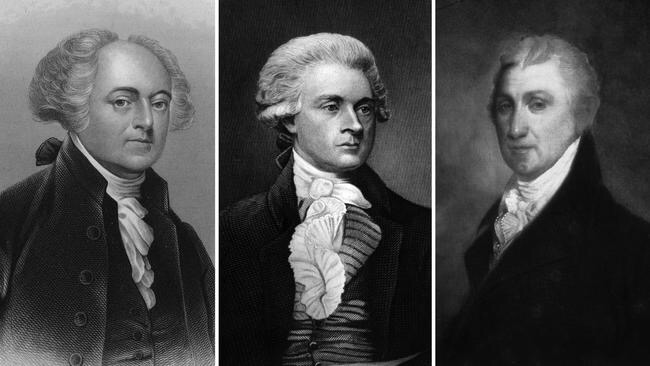

On July 4, 1831, James Monroe died from heart failure and tuberculosis at his daughter’s house in New York City. The fifth U.S. president had attempted to write an autobiography, but was unable to complete it as his health slowly deteriorated after his wife died the year before.
Thousands of mourners crowded the narrow New York City streets to see the 73-year-old’s hearse make its way to the family vault in Marble Cemetery.
With his death came an eerie coincidence that many people couldn’t ignore: Monroe had become the third president and Founding Father to die on the Fourth of July.
Five years earlier, on the 50th anniversary of the Declaration of Independence, longtime friends and occasional rivals Thomas Jefferson and John Adams also died.
Adams served as the second president from 1797 to 1801, followed by Jefferson, who served until 1809. But long before the 13 colonies had won their independence, Adams and Jefferson played vital roles in creating the document that declared men were created equal and entitled to “life, liberty and the pursuit of happiness.”
Adams, in a letter to a friend in 1822, recalled how Jefferson was placed on the committee to write the document. “Mr Jefferson came into Congress in June 1775 and brought with him a reputation for literature, science, and a happy talent at composition. Writings of his were handed about, remarkable for the peculiar felicity of expression,” Adams wrote.
The irascible Adams also described why he insisted that Jefferson write the draft:
“Jefferson proposed to me to make the draught. I said I will not; You shall do it. Oh No! Why will you not? You ought to do it. I will not. Why? Reasons enough. What can be your reasons? Reason 1st. You are a Virginian, and Virginia ought to appear at the head of this business. Reason 2d. I am obnoxious, suspected and unpopular; You are very much otherwise. Reason 3d: You can write ten times better than I can. ‘Well,’ said Jefferson, ‘if you are decided I will do as well as I can.’”
“People interpreted their deaths in a religious manner,” said Michael Meranze, a U.S. history professor at UCLA. “It was clearly taken symbolically as both the birth and growth of the early republic.”
In 1826, for instance, Rep. Daniel Webster of Massachusetts delivered a two-hour-long eulogy in Boston suggesting their deaths were a sign that God was protecting the nation.
“As their lives themselves were the gifts of Providence, who is not willing to recognize in their happy termination, as well as in their long continuance, proofs that our country and its benefactors are objects of His care?” Webster said.
Religion played a prominent role in the lives of many Americans during the early 19th century — an era known as the Second Great Awakening that took off around the late 1820s and early 1830s. It was only natural that many Americans of the era saw religious significance in the timing of the deaths of Adams, Jefferson and Monroe.
By Melissa Etehad
Contact Reporter
source: http://www.latimes.com/nation/la-na-july-fourth-presidents-20170704-story.html






























